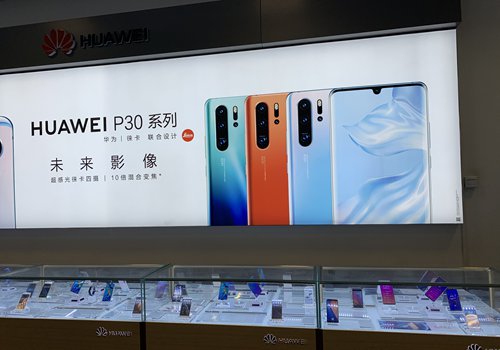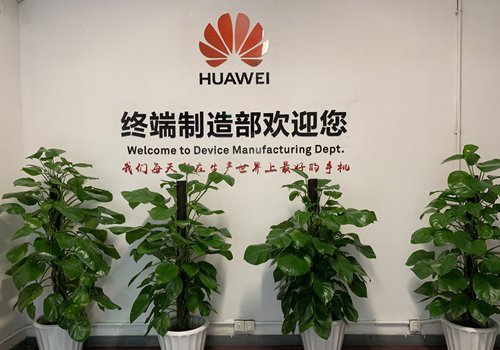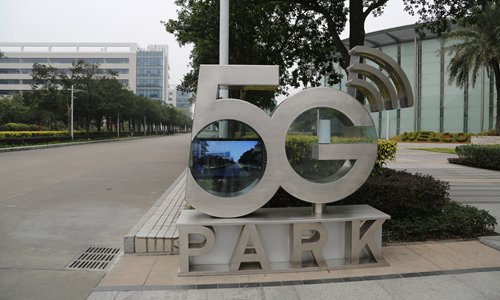HOME >> BUSINESS
Huawei to survive pressure
By Chen Qingqing in Dongguan Source:Global Times Published: 2019/5/20 22:58:40
Google manipulated by politics, hurting industry: analysts

Smartphones are displayed at the entrance to a Huawei factory in the city of Dongguan, South China's Guangdong Province on Monday. Photo: Chen Qingqing/GT
China's Foreign Ministry on Monday voiced support for companies to use "legal weapons" to safeguard their legitimate rights just hours after Google reportedly restricted Huawei's access to Android services in a move that Chinese analysts predicted would disrupt the global tech industry.
"We will follow the development of the issue and China supports Chinese companies taking legal weapons to defend their legitimate rights," Lu Kang, ministry spokesperson, told a daily briefing on Monday.
Google is reportedly suspending some of its business with Huawei following export controls introduced by the administration of US President Donald Trump.
Huawei will only be able to access some of Google's software and services that have open source licensing, Reuters reported on Monday.
In a statement sent to the Global Times on Monday, Google said it was "complying with the order and reviewing the implications," without elaborating.
The restrictions will affect Huawei's smartphone business outside China as it will immediately lose access to updates to Google's Android operating system, Reuters said. Future versions of Huawei smartphones that run on Android will also lose access to popular services including the Google Play Store, Gmail and YouTube apps.
But Android tweeted on Monday that "services like Google Play & security from Google Play Protect will keep functioning" on existing Huawei devices.
"As one of Android's key global partners, we have worked closely with their open-source platform to develop an ecosystem that has benefitted both users and the industry," Huawei said in a statement sent to the Global Times on Monday.
It noted that Huawei will continue to provide security updates and after-sales services to all existing Huawei and Honor smartphone and tablet products, covering those that have been sold and that are still in stock globally. Honor is a leading smartphone brand under Huawei.

"Every day we produce the world's best cellphone" reads a slogan at the entrance to the Huawei factory in the city of Dongguan, South China's Guangdong Province. Photo: Chen Qingqing/GT
The latest move is believed to be part of broader efforts by Washington in cracking down on the Chinese firm amid an escalating China-US trade spat, which Chinese analysts dubbed a Cold War in the tech industry.
The move indicated a "barbaric" market intervention by the US, said Fang Xingdong, founder of technology think tank ChinaLabs.
"The US has accused the Chinese government of stepping in and controlling companies, but how about themselves? They made a very nasty move depriving Huawei of normal business," Fang told the Global Times on Monday.
The Global Times reporter visited a production line for Huawei's flagship P30 cellphone device at its manufacturing hub in Dongguan, South China's Guangdong Province, on Monday.
The US sanctions did not appear to have affected staff morale or production at all at Huawei's headquarters.
On the 120-meter- long production line, one smartphone is produced every 28.5 seconds, with a total monthly output of about 3 million units.
"The impact [of US sanctions] is little, as we have not changed our production planning so far and the factory operates at full capacity," a source with close information of the matter in Huawei, who preferred not to be named, told the Global Times.
He also said that he was confident that the factory would meet this year's shipment target. Huawei is aiming to be the biggest smartphone brand in the world by 2020.
Huawei sold about 30 million units to the Chinese mainland market in the fourth quarter of 2018, or about half its global total, according to IDC data.

Huawei's headquarters is 5G Park in Shenzhen. Photo: Chen Qingqing/GT
More independent
Google's move will inspire the domestic software industry to enhance self-reliance in core technologies, Wang Yanhui, head of the Mobile China Alliance, told the Global Times on Monday.
"For Huawei, it still takes time for the new ecosystem to become mature though the company has been working vigorously on its proprietary operating system," said Wang.
Huawei's own operating system, reportedly named "HongMeng OS," is now surfaced and will gradually replace the Android system, according to media reports. Richard Yu Chengdong, head of the company's smartphone division, said earlier that Huawei is working on its self-developed operating system in case US tensions disrupt the use of Android.
"We have foreseen this day coming, but it came faster than we expected," a source close to the matter told the Global Times.
Google's Android and Apple's iOs are the two major operating systems for mobile devices.
In 2018, Android held about 85.1 percent of the market, while iOS had 14.9 percent, according to industry consultancy IDC.
If Google can't handle this properly, it will break Android dominance of the market as it will lose the second-largest Android smartphone vendor, Fang noted.
Google is not the only tech company following US sanctions against Huawei.
Top US corporations including Qualcomm and Intel have frozen supply of critical software and components to Huawei, Bloomberg reported on Monday.
"It is crystal clear now which tech company is manipulated by politics," said Xiang Ligang, director-general of the Information Consumption Alliance.
Huawei is expected to continue communicating with Google and Android to mitigate the impact, said the anonymous source.
Cutting off cooperation will also hurt US firms, as they risk losing out on the world's largest smartphone market when homegrown operating systems become fully operational, Xiang told the Global Times on Monday.
"That will harm the global tech industry," he said. "Washington doesn't want that. It wants only pressure so it can return to the negotiating table."